- Home
- David Sedaris
Squirrel Seeks Chipmunk Page 6
Squirrel Seeks Chipmunk Read online
Page 6
The chicken had never thought about it this way and supposed the hen had a point. Though a missing eye was certainly nothing to be proud of, neither was it a reason to feel particularly ashamed.
“We’ve all got our little quirks,” the guinea hen offered. “Some are visible, and others are on the inside, where no one can see them. Me, for instance, I’m super compassionate, was born that way, I suppose. If I see someone suffering, it just bothers the heck out of me, no matter who it is. This worm, for example, got bitten by a centipede, and I sat up half the night, comforting him until he died.”
“But he was just a worm,” the chicken said. “Why didn’t you eat him?”
“Oh, I’m a vegetarian,” the guinea hen explained. “Grain is good enough for me, but even then I never have more than a few kernels a day. What with all the starving songbirds struggling to feed their families, it hardly seems fair to take more than we need.”
“But songbirds are trash,” the chicken said, and the guinea hen laughed, saying, “Well, then, I guess we could all use a little more trash in our lives.” She turned to admire a lark who perched singing on the low branch of a tree, and the chicken was struck by how thin she was and how her weight corresponded to a kind of inner peace. “Hello, little lark,” the guinea hen said. “Are you having a nice day?”
“What’s it to you, what’s it to you, what’s it to you?” the lark sang, and as the guinea hen offered her calm, beatific smile, a hawk swooped in and seized her in his mighty claws. The motion was fluid and almost beautiful. No beating of wings, just an effortless glide back into the sky and toward the distant treetops.
The lark roared with laughter, but the chicken used the incident as an opportunity to reflect and learn something. The hawk could just as easily have abducted her, but it did not. The question was, why? A less spiritual being might have taken a practical approach: the guinea hen was smaller and easier to carry. But that wasn’t the answer, and the chicken knew it. The hen had been killed because she empathized too much and was strange to boot. “Everybody’s different”; “Larks are worthy too.” She should have spent more time eating and less time running her mouth, that was the lesson here, and the chicken intended to follow it. From now on she would consume twice as much and be twice as ashamed of her missing eye. On top of that she would love the rooster with all her heart and go out of her way to criticize songbirds, who were all a bunch of thieving hillbillies.
…
A month after the guinea hen’s death, the chicken was so heavy her thighs chafed. Her ankles hurt pretty much all the time, and her neck had been completely denuded by the rooster, who’d had it with what he called “That pissedy-assed love-talk shit.” Something had moved into the hole formerly occupied by her left eye, but she refused to dwell on it. What few thoughts she allowed herself to entertain were reserved for the big things: death, mainly, and what might be learned in its aftermath. A fox stole into the henhouse one night and carried off the gray pullet, who screamed that she was too beautiful to die even as he was tearing a hole in her throat. Vanity, the chicken thought, and she swore off grooming herself or examining her reflection in the ditch. When a good-natured and sociable goose was struck by lightning, the chicken stopped talking altogether, much to the delight of the rooster.
“Gloomy,” they started calling her, and she spent more and more time alone. She was by herself in the henhouse one morning when she saw a snake glide toward a nest and swallow an egg, the entire thing, whole. It hadn’t been hers, but still she had to wonder what the unhatched chick had done to warrant such extreme punishment. It hadn’t existed yet, so harboring unnatural thoughts was out, as was being excessively vain. Having lived alone inside its shell, it could hardly be accused of being too social or of eating any less than its fair share. The egg’s crime, as far as she could see, was that it had been brown and roundish. Just like me, the chicken thought, and in that moment the farmer’s wife came up from behind and grabbed her by the throat.
The Parrot and the Potbellied Pig
When asked why she’d chosen to become a journalist, the parrot was known to cock her head a half inch to the right and pause for a moment before repeating the question. “Why did I choose to become a journalist? Well, the easy answer is fairly obvious. Perfect recall is something I was born with, but I guess what really drives me is the money. That, and the free booze.” It killed her to follow this with “I was just joking about the money.”
The paper she worked at was called The Eagle, and she wrote for the Tempo section, which was later renamed Lifestyles and was now titled simply Living. Most of her stories were little more than puff pieces: interview the wealthy tortoise who’d shelled out money for the new speedway; cover the benefit gala for feline leukemia research, for hip dysplasia, for ringworm or heartworm or the Hookworm Anti-Defamation League. She wanted an opportunity to show her chops, and finally got her break when a potbellied pig took over as director of the local art museum. The Eagle wanted something simple-three hundred words, tops-but the parrot thought differently and scheduled a long lunch.
Her guest arrived on time, and, after ordering, they got down to business. “So,” the parrot began, “it’s a long way from Ho Chi Minh City to the much-coveted director’s chair of a noted museum. I’d like you to reminisce about the journey a little.”
“I’m sorry,” the pig said, “but I’ve never been to Ho Chi Minh City.”
“But you are from that region, are you not?”
“No,” the pig told her. “Not at all.”
The parrot ran her fat black tongue over the ragged edge of her upper beak. “I don’t mean to contradict you,” she said, “but I’ve done a little legwork, and it seems that you’re officially registered with your health-care provider as a Vietnamese potbellied pig. So let’s turn our thoughts eastward, shall we, and talk about your past.”
“Technically, yes, I am a Vietnamese potbellied pig,” the museum director said. “But that’s just a silly formality. The fact is that I was born in this country, as were my parents, and their parents before them.”
“I see,” the parrot said, and she scratched the word “self-hating” in her notepad. “So how will your ethnicity reflect itself in regard to our museum? Can we expect to see more Oriental art? A pricey new Ming Wing perhaps? Some big ‘Treasures of the Emperor’ extravaganza?”
“Nothing’s planned,” the pig said.
“But you wouldn’t rule it out?”
“Well, no, not completely, but-”
“That’s all I wanted to know,” the parrot said, and at that moment their lunch arrived.
It was she who had made the reservation, and in a flash of inspiration, she’d decided they’d go to Old Saigon. The fact that it was her idea would not be mentioned in the article. Nor would she add that the pig had never in his life used a pair of chopsticks and that he gripped them, one in each hoof, as if they were screwdrivers. During the meal-a few blades of lemongrass for him, a Mekong platter for her-they talked about this and that, but she wasn’t really engaged, busy as she was dreaming up a headline. “Museum Takes on Asian Slant” was good, but she’d have to fight hard to get it past her editor, who despised what she called “wordplay.”
When their lunch was over, the pig trotted back to the museum, and the parrot headed down to the VFW Hall, where she hoped to round out her article. There she spoke to a red-shouldered hawk who hadn’t actually fought in Vietnam but who might have, had the war lasted just a few weeks longer. “I could have practically been killed over there, and now one of them is coming to my museum, trying to tell me what art I should look at?”
“I hear you,” the parrot said.
The article was due the following morning, and she stayed up all night to finish it. Her editor scowled at the bulk of pages but softened after the first read-through, saying, “Good work, you” and “Maybe we should send this over to the city desk.”
The eventual headline was no masterpiece-“Potbellied Museum Director Sti
rs Controversy”-but the parrot was so relieved to move out of the Living section that the paper could have called it “Shit on a Stick” and she wouldn’t have cared.
As for the pig, he wasn’t nearly as upset as she’d thought he would be. Rather than threatening a lawsuit or demanding a retraction, he phoned to say that he was disappointed. “Deeply disappointed” were his exact words. The parrot reached for her pen, hoping for quotes that might lead to a second article. “Is that all you have to say?” she asked, and in response he sighed and gently hung up the phone.
“Hello?” the parrot said. “Hello? Hello?”
The pig would not have admitted it, but what really bothered him was the “potbellied” business. He had been plump all through his youth, and the years of name-calling had not just shaped his adult life but deformed it, like some cell made crazy by radiation. He couldn’t remember the last time he had eaten without thinking-popped a passing canapé into his mouth, finished an entire potato chip or dry roasted peanut without calculating the damage. While others prepared for bed, he ran a treadmill. They tucked into their ample breakfasts, and he hung upside down from a bar in his living room, doubling at the waist until he saw stars. Then came the traditional sit-ups and half a slice of dry Ryvita before examining his silhouette in the hallway mirror and getting ready for work. His waist size was twenty-eight. His body-fat index was 2 percent. He did not have a potbelly. He would never again have a potbelly. Now here was this article, essentially comparing him to the Buddha.
After hanging up on the reporter, the pig began a three-day fast. Lunchtime came, and as his colleagues shuffled to the museum cafeteria, he sat at his desk and looked out the window at that stupid hawk, marching back and forth with his picket sign. The veteran had hoped that others might join him, but none of his fellows seemed to care. “The war is over, and it’s time to move on,” they’d been quoted as saying. “Who cares if some”-and there was that word again-“Who cares if some potbellied Charlie wants to hang pictures on a wall?”
“Damn that parrot from The Eagle!” The pig’s anger felt vaguely nourishing, but he knew it was misplaced. The reporter hadn’t assigned the animals their names; that was someone else’s doing, someone who sat back and ordained-largemouth bass, humpback whale, lesser wart-nosed horseshoe bat-not caring whose life was ruined.
By the time he next ran into the parrot, the pig had lost close to ten pounds. They met at a museum benefit, a costume ball that he hosted and that she hovered on the edges of, guzzling rum punch and gathering quotes she’d heard a thousand times before (“Wonderful party, and of course it’s for such a good cause”). The parrot was, she liked to joke, “back with the Living, by which I mean section, not the sensation of being alive.”
She’d assumed that the pig would be in disguise and was surprised to see him in the same dark suit he’d worn at the restaurant. He was standing at the bar, nursing a glass of water, and she came from behind and tapped him on the shoulder. “Let me guess,” she said. “You’re Henry Bacon, right?”
“Who’s he?” the pig asked.
The parrot rolled her eyes. “American architect? Designed a little something called the Lincoln Memorial?”
“Oh,” the pig said, “that Henry Bacon.” He was going to admit that he was no one, or at least no one special, when the parrot stepped back and examined him again over the rim of her punch glass. “I’ve got it,” she said. “You’re Luther Hamm. Took the silver medal for the four-hundred-meter freestyle, Helsinki, nineteen fifty-two. Little wisp of a thing but, boy, did he have shoulders.”
“Right,” the pig said. “So who are you supposed to be?”
The parrot shrugged and held up her glass for a refill. “I thought I’d go all out and come as a two-bit journalist.” For verification she presented an ink-stained claw, the nails of which were bitten to the quick. “So, hey,” she added, “I’m sorry about the article. I haven’t been that irresponsible since I worked in pirate radio. Broadcast journalism was never my thing, but you know how it is sometimes. You get pegged.”
“That’s all right,” the pig told her.
“All right for you,” the parrot said. “I’m the one with a goddamned hawk calling me every ten minutes. Now he wants to go after Middle Easterners. Heard of a Persian cat who runs a parking garage down by the Civic Center and is after me to write an ‘exposé.’ ”
The pig laughed for the first time in months, and then looked down to see the parrot’s wing resting on his stomach. “Is it my imagination, or have you lost some weight?”
“No,” he told her. “I mean, yes, I did. It’s not your imagination.”
He thought of how kind it was for her to mention it, and then he noticed how oddly satisfying it felt to be patted down by a wing.
Meanwhile, the parrot was still talking. “Don’t get me wrong,” she said. “I have seen a cockatoo in my time, but I’m not dating anyone now, if that’s what you’re wondering.” She grabbed a passing appetizer, dumped the caviar back onto the tray, and ate only the cracker. “A cliché, I know, but fish eggs make me bloat.”
“It’s the salt,” the pig told her. He’d hoped to say something more interesting, but just then the band started up.
A wolf in sheep’s clothing called out for a fox-trot, and, as if a switch had been thrown, the party came to life. Here was the hare in cat’s pajamas dancing with a chameleon, whose costume changed with every turn. The ugly duckling cut in on a swan. A trio of mice lowered their sunglasses, and as they scoured the floor for partners, the parrot turned to the pig and held out her claw. He accepted it awkwardly in his hoof, and so began what the reporter would later refer to as her days of swine and neuroses.
Hello Kitty
It was the stupidest thing the cat had ever heard of, an AA program in prison. Like you could find anything decent in here anyway. But if it would get his sentence reduced, well, all right, he’d sign up. Dance the twelve-step, do whatever it took to cut out early. Once he was free he’d break into the nearest liquor store and start making up for lost time, but between now and then he’d sit with the sad sacks and get by with a little aftershave. The only thing he wouldn’t do was speak at one of the meetings.
As a rule they were strictly dullsville. Yammer, yammer, yammer, but every now and then someone would tell a decent story. This mink, for example, who’d swapped his own pelt for a bottle of Kahlúa. The cat didn’t know you could survive without a pelt, but apparently it was possible. Not pretty, that was for damn sure, but it could be done, and this mink was living proof. It helped that he had a sense of humor about it and told his story with a little pizzazz, complete with sound effects and different voices. When he came to the bit about his wife mistaking him for a beef tongue, the cat laughed so hard he fell out of his chair.
“Thank you,” the mink said at the end of his little speech. “You’ve been a terrific audience. Now don’t forget to tip your waitress.”
After the meeting, the alcoholics congregated for treats washed down with burnt coffee. The cat was just going back for a second cup when he overheard a mouse talking in a low voice to the bullfrog, who served as the prison chaplain. “He might be amusing, but I don’t give that mink a snowball’s chance in hell. In here, all right, but out in the real world, he’s a ticking time bomb.”
The cat didn’t know what this mouse was in for, but he was willing to bet it was something boring: fiddling with his taxes or mail fraud. He wouldn’t know a good time if it slapped him between the ears, but here he was, ragging on the hairless mink: “Refuses to take his recovery seriously,” “A classic example of a dry drunk.”
Give the guy a break, the cat thought. The poor bastard is permanently naked. His wife left him, his chop shop was confiscated, so who the hell cares if he starts drinking again? It beats wasting time with the likes of you.
The cat didn’t say any of these things, but he thought them, and it must have shown on his face.
“Do you have a problem?” the mouse asked.
<
br /> And the cat said, “Yeah, as a matter of fact I do.”
Sensing trouble, the chaplain moved between them and held out his webbed hands. “All right, gentlemen,” he said, “let’s just take this down a notch.”
“I’ve got a problem with certain rodents,” the cat continued. “The kind who think that unless you’re as pompous as they are, you’re going to wind up on the trash heap.”
“Is that so?” the mouse said. “Well, I got a problem with cats who try to take someone else’s inventory before they’ve taken their own.”
He was a spunky little thing, you had to give him that. Here he was, no taller than a shot glass, yet he was more than willing to mix it up, and with a cat, no less. “Don’t think I’m going to forget this,” he said as the chaplain pulled him back.
And the cat said, “Oh, I’m so scared.”
When dinnertime came, the cat joined the mink for burgers and fries in the prison cafeteria. The mouse was on the opposite side of the room, sitting between a rabbit and a box turtle at the vegetarian table, and every few seconds he’d look up from his plate and glare in the cat’s direction.
“I don’t know what’s going on between you two,” the mink said, “but you’d better find some friendly way to straighten it out. I’m telling you, brother, you do not want that mouse as an enemy.”
“What’s he going to do,” the cat said, “steal the cheese off my hamburger patty?”
“I don’t know what he’s going to do, but I know what he did do,” the mink said, and he leaned his raw, seeping head across the table. “They say it was arson. Chewed through some wires and set a police building on fire. Four German shepherds killed on the spot, and two more so burnt their own mothers wouldn’t recognize them. Now, I don’t know what you’d call it, but in my book, brother, that’s cold.”

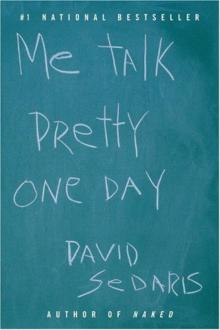 Me Talk Pretty One Day
Me Talk Pretty One Day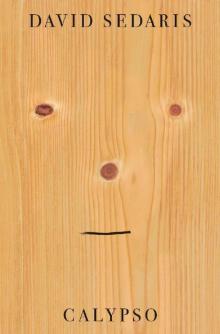 Calypso
Calypso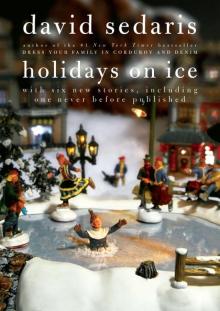 Holidays on Ice
Holidays on Ice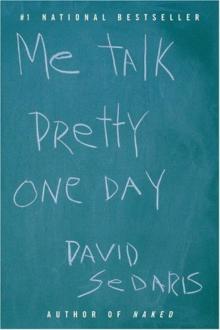 Mi vida en rose
Mi vida en rose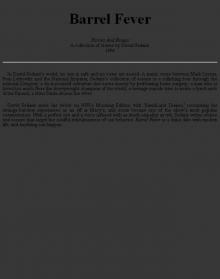 1994 - Barrel Fever
1994 - Barrel Fever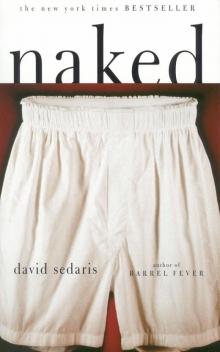 Naked
Naked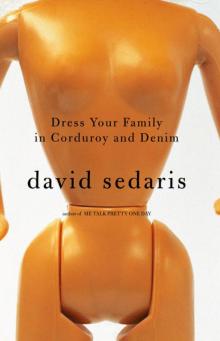 Dress Your Family in Corduroy and Denim
Dress Your Family in Corduroy and Denim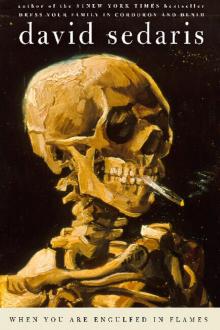 When You Are Engulfed in Flames
When You Are Engulfed in Flames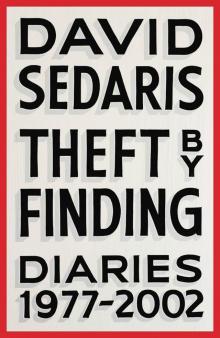 Theft by Finding: Diaries 1977-2002
Theft by Finding: Diaries 1977-2002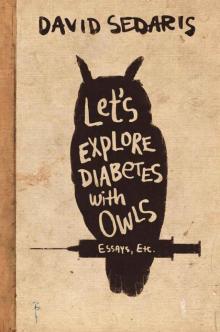 Let's Explore Diabetes With Owls
Let's Explore Diabetes With Owls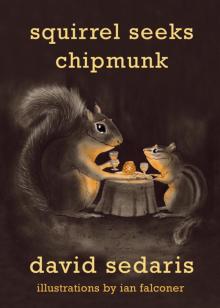 Squirrel Seeks Chipmunk: A Modest Bestiary
Squirrel Seeks Chipmunk: A Modest Bestiary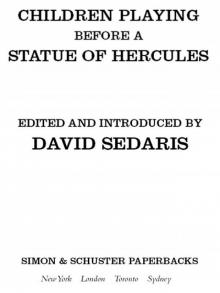 Children Playing Before a Statue of Hercules
Children Playing Before a Statue of Hercules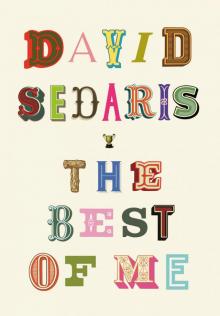 The Best of Me
The Best of Me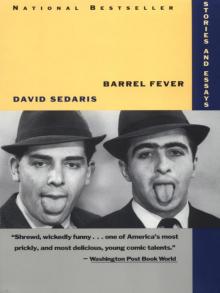 Barrel Fever
Barrel Fever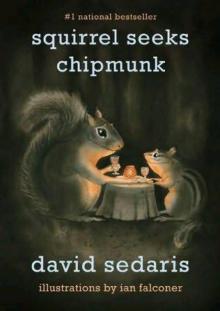 Squirrel Seeks Chipmunk
Squirrel Seeks Chipmunk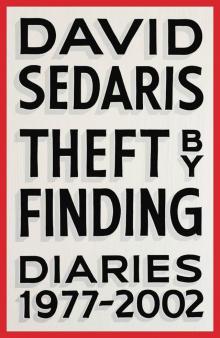 Theft by Finding
Theft by Finding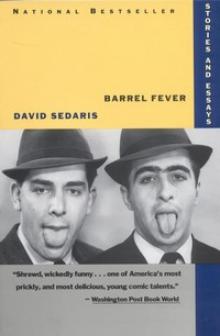 Barrel Fever and Other Stories
Barrel Fever and Other Stories